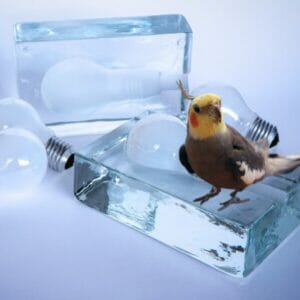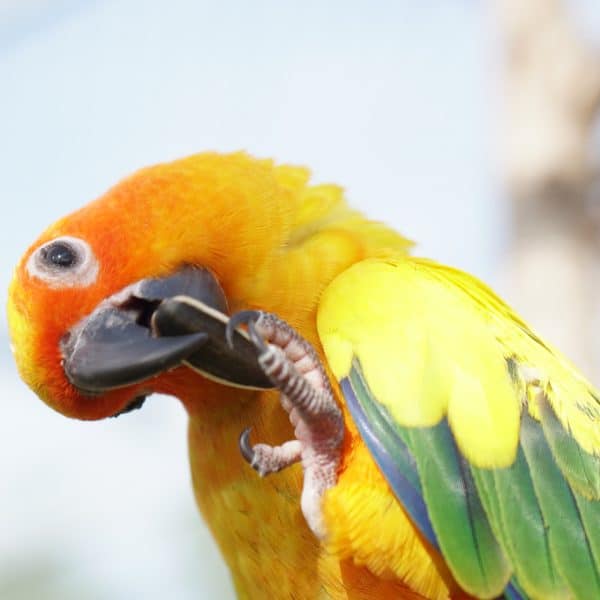Last Updated on by Mitch Rezman
You’ve been elevated to zookeeper
Dear Mitch,
I need advice in so many “bird” areas that I don’t know where to begin. It seems that all the personal bird stores are disappearing and even the good vets are a rarity. I have been involved with birds for almost thirty years.
I ordered a small crock on Amazon about a year ago and that is how I became “connected” with Windy City, your Sunday newsletters, etc. It is the result of a vision “issue” that discourages me with the computer and I do much better “talking”.
Currently, I have eight birds, the youngest two parakeets that were hatched here two months ago and three weeks apart. The little mom was found five years ago and she was little more than a baby. I never had good luck with little birds, but two years ago I decided to buy her a friend.
Now the friend is mate and she has been laying eggs in profusion, but only two have hatched. I separated the chicks from the parents as soon as they left the nest box and I knew they were eating on their own.
I called WC because I need a decent cage for the kids. 8″ by 15″ is too small, too messy, but it was here.
I adopted two female Senegals in 1989 & 1993 and they never became friends so separate cages.
My male Amazon (blue front) was rescued from a shop that was closing and he was hatched in May ’87.
He is antisocial. Finally, there is a female Sever Macaw who was hatched in Nov. 87 and I hand fed. She has issues.
She started feather picking within the past year and her torso looks like a squab ready to be someone’s dinner.
I think she is rebelling because I rehomed a Sulfer (sic) Crested Cockatoo who I took in twenty years ago. I didn’t know she cared, but he was making life unpleasant for me. Another story.
The two big birds are not eating well. They both stopped talking when my husband’s Yellow Nape died at age 7. more than twenty years ago. She was a wonderful bird and we never replaced her.
My husband “turned off” on the birds after that so I have been pretty much on my own. He would build perches, but that was it.
So. I need someone to give me advice. Will you talk with me? I just need a human being who knows what he is talking about.
Sincerely,
Sydney Sue H
Let’s start by evaluating your livestock inventory.
BTW – congratulations – you’re no longer simply a caged bird keeper. You’ve been elevated to zookeeper
2 parakeets (we’re assuming “budgies”) – Australia
2 parakeets – offsprings – Australia
2 female Senegals – Africa
1 male Amazon (blue front) – South America
1 female Severe Macaw – South America
Sydney Sue
This is a complex matrix to sort through. You’ve got birds from three continents.
You’re blaming The severe macaws plucking on the rehoming of a cockatoo and yet your husband has removed himself from the flock which begs the question was the macaw bonded with your husband?
What we really need to see is how your cages are set up allowing the birds to interact is there any way you can send us pictures of this so we can begin to evaluate?
Our specialty at Windy City Parrot is promoting optimal care for exotic birds by providing the most favorable home environment.
We also need to know what you are feeding them? Is it one common food or is every species getting a unique blend suited to their unique metabolism?
Send us some pics so we can have this convo.
From Don G – Subject Cockatiel food
Message
Hello, next week I will be rehoming 2 two-month-old cockatiels to my home. I’ve had budgies and finches in the past but these are my first tiels. I’ve purchased several books, but have questions about diet.
I know I should have some seed but mostly pellets as a basis, as well as fresh vegetables and fruit.
Can you recommend good packaged cockatiel foods for me and I’ll order them on your site. I want to know what are good products, especially the pellets since I don’t know much about the brands. Thank you, Don
Dear Don
Two new cockatiels will be great additions to your flock, er family. They are relatively quiet birds and will be lots of fun for years to come.
Starting them outright on a good diet will help them stay healthy and avoid fatty liver disease.
Cockatiels, like Quakers and Amazons, can tend to gain weight from their good appetites and of course, they like to eat junk like we do if given the chance.
Sprinkling pellets on the cage floor will entice them to try them if they are anything like my cockatiel Popcorn.
She likes to graze on the floor where I see nothing but she will pick and nibble her way around like a little hoover.
Providing them with a small pellet will make it more likely that they will try them. Birds often will ignore food that is larger than a bite. Small pellets are more enticing, especially to small birds.
We have one line of small pellets that I particularly like made by Hagen which is a wonderful company with quality ingredients and their pellets have a fruity scent from orange oil.
Hagen Tropican Cockatiel Granules.
If you would like to add a seed mix, the Hagen Living World Cockatiel is a good complementary mix that is made by the same manufacturer and shares the pellets so the whole line is the same.
Living World Cockatiel & Lovebird mix has the small seeds that cockatiels enjoy as well as dried fruit and vegetable bits and also includes the sweet-smelling Cockatiel Granules which round out their diet well.
You can increase the pellets ratio to the seed mix if you would like to encourage more pellets than a seed diet. Your birds should live a long healthy and happy life.
Including fresh veggies like dark leafy romaine is a good item. Cooked carrots are very appreciated by my tiel. Providing a dish with something fresh every day in the morning and removed before dark will help to get them to look forward to a little something extra and expand their diet options.
Chopped cooked veggies will appeal to cockatiels more until they get used to biting on them, then you will have more luck with raw. They also like cooked beans (mashed to start), cooked eggs, noodles, a cracker now and then. Avoid salty foods.
I hope this helps.
Catherine
On Sun, Oct 9, 2016 at 4:29 PM UTC, Connie S wrote
I looked at the anatomy of a bird’s brain that you had on a recent email. I would like to know more about the portion that says: Short Circuit from love to attack behavior!
That is happening with my rainbow lory recently. He is 18 years old and has suddenly started attacking my hand when I reach to have him climb on my finger.
Otherwise, he hangs out with me with no problem – when I’m sitting in a chair or lying on the bed. He was always a bit ornery.
But, this has happened twice now and it was really violent. I am assuming he is afraid of something.
But, I don’t know what. Is there a book you would recommend? Or should I call and speak with someone there? Thank you so much!!!
Hi Connie and thanks for reaching out to Windy City Parrot for help.
At age 18, sudden onset aggression can be the result of a medical issue causing him pain, so have a check-up with your vet.
But first, look at the area of your home where you were attacked. Has ANYTHING changed?
A new picture added, wallpaper, new hygiene products you are using, jewelry, unusual nail polish?
ANYTHING that has changed could be causing him to see “danger colors” I once had my nails done in a OPI brand iridescent nail polish.
My sweet tame conure became attack conure until I removed it later the same day ($50 down the drain on that manicure) but that was the cause because she was seeing colors not visible to the human eye.
Any change in the home causing fear should be changed back. One lady placed a a bit red op-art painting opposite her bird’s cage.
The bird freaked out and became mean until she removed the painting to another part of the home.
Also, you should give AviCalm by Avitech to help with any stress and really, every bird has stressed its life.
It may well resolve the aggression along with looking into habitat changes that could be causing fear.
the Caged Bird Keeping Experts
2:08 PM (21 minutes ago)
to Connie
Change can be a good thing, but too much too fast can be bad. Perhaps change a thing or two back, see how he reacts, if he is still aggressive even with AviCalm and a few changes back then do a few more changes back.Moving a cage can be a great move, but stressful if he doesn’t like the new placement.
You probably know few birds accept new toys right away, so imagine changing his whole world in one day. Please keep up posted because we love to hear how our advice works for parrot parents. Best wishes from all of us at Windy City Parrot.
On Sun, Oct 9, 2016 at 6:13 PM UTC, Connie S wrote
Oh my! Thank you soooo much for that information. Yes. Everything is changed in his environment, actually. His cage has been moved to another room. So, I will have to check on a few things. And, get the Avicalm. Thank you again!!!
Author Profile
Latest entries
 Feeding Exotic BirdsDecember 29, 2025How to Switch or Convert Your Bird From Seeds to Pellets: Real-Life Case Studies and Practical Guidance
Feeding Exotic BirdsDecember 29, 2025How to Switch or Convert Your Bird From Seeds to Pellets: Real-Life Case Studies and Practical Guidance Feeding Exotic BirdsDecember 16, 2025A Practical, Budget-Smart Guide to Feeding Birds Well
Feeding Exotic BirdsDecember 16, 2025A Practical, Budget-Smart Guide to Feeding Birds Well Bird EnviornmentsDecember 7, 2025Understanding Budgie Cage Bar Orientation: Myths, Realities & Practical Solutions for Vertical-Bar Bird Cages
Bird EnviornmentsDecember 7, 2025Understanding Budgie Cage Bar Orientation: Myths, Realities & Practical Solutions for Vertical-Bar Bird Cages Feeding Exotic BirdsDecember 5, 2025How Dr. T.J. Lafeber Rewrote the Future of Pet Bird Nutrition
Feeding Exotic BirdsDecember 5, 2025How Dr. T.J. Lafeber Rewrote the Future of Pet Bird Nutrition



